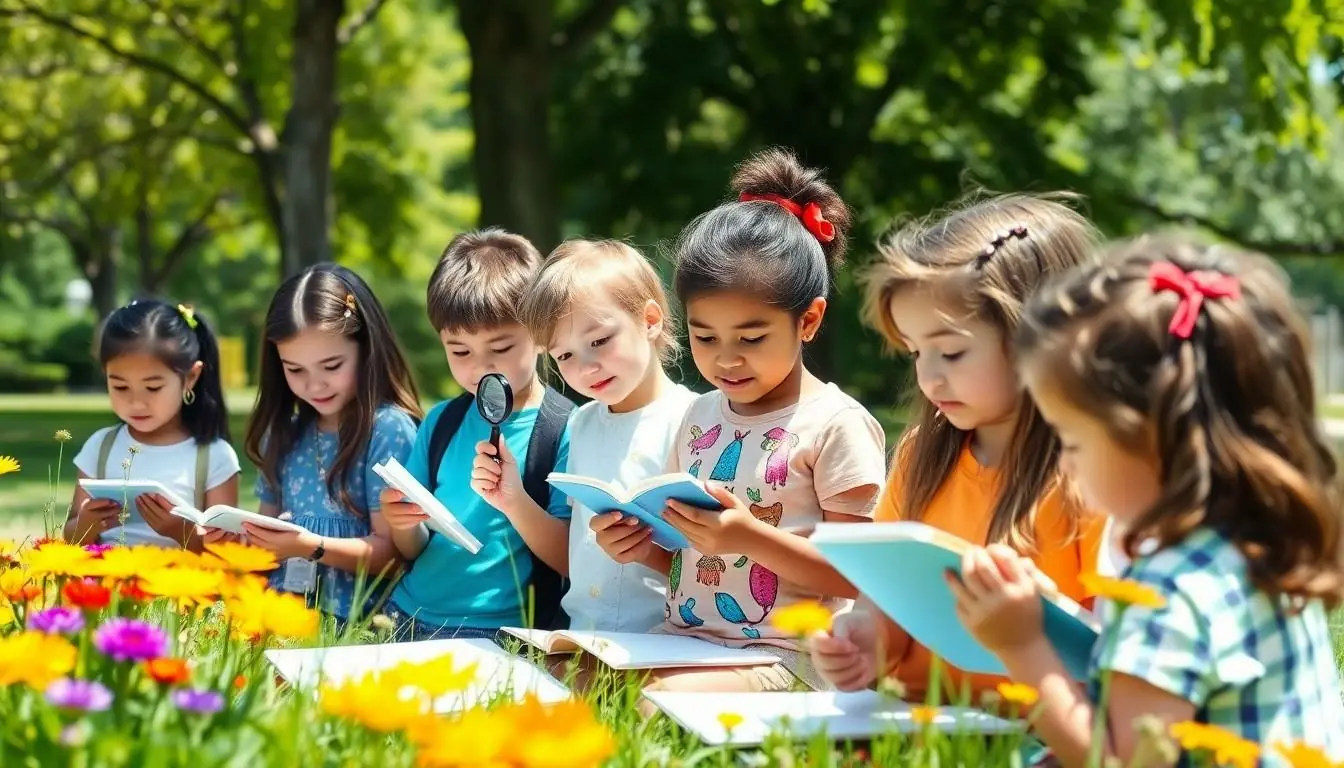In a world where education often feels like a monotonous grind, Charlotte Mason homeschooling emerges as a refreshing alternative. Imagine a method that encourages children to explore the world around them, fostering a love for learning rather than just memorizing facts. It’s like turning the classroom into a whimsical adventure where nature walks, living books, and artistic expression reign supreme.
This approach isn’t just about hitting the books; it’s about nurturing a child’s curiosity and creativity. By embracing the Charlotte Mason philosophy, parents can transform their homes into vibrant learning environments. So, if you’re tired of the traditional school routine and want to sprinkle a little magic into your child’s education, it’s time to dive into the enchanting world of Charlotte Mason homeschooling. Who knew learning could be this fun?
Table of Contents
ToggleUnderstanding Charlotte Mason Homeschooling
Charlotte Mason homeschooling promotes an engaging educational experience founded on nurturing a lifelong love for learning. This approach emphasizes exploration, creativity, and interaction with the world.
Origin and Philosophy
Charlotte Mason’s educational philosophy emerged in the late 19th century. Her insights derived from a firm belief in the value of a rich, immersive education. She advocated for respect towards children’s capacity for learning. This method merges academics with moral and social development. Mason’s philosophy stresses the importance of nature and art, facilitating personal growth through meaningful experiences. Her approach encourages families to create a home environment filled with beauty and knowledge. The emphasis lies in holistic education, integrating discipline with joy and wonder.
Key Principles of Charlotte Mason
Charlotte Mason’s method hinges on several key principles. The first principle centers on using living books, which provide engaging and thought-provoking content. Another important aspect involves promoting narration, where students recount what they’ve read, enhancing comprehension and retention. Mason also underscored outdoor learning through nature walks and direct observation. This approach fosters a connection to the environment. Additionally, the incorporation of art and music enriches the educational journey. Encouraging habits of good character and self-discipline serves as another significant principle. These core tenets collectively contribute to a vibrant, well-rounded education.
The Curriculum Approach
Charlotte Mason homeschooling promotes a broad and integrated educational experience. The curriculum encompasses various subjects, ensuring students develop a well-rounded knowledge base and skills.
Subjects Covered
Core subjects include language arts, mathematics, science, history, geography, art, and music. Literature plays a significant role, featuring high-quality living books that ignite imagination and critical thinking. Nature studies promote outdoor exploration, encouraging students to observe and appreciate their surroundings. Additionally, character education emphasizes moral development, guiding children toward ethical decision-making. Each subject interconnects, fostering a cohesive understanding of the world.
Learning Materials and Resources
Living books serve as primary educational tools. These engaging narratives captivate students and inspire thorough comprehension. Parents may also use nature journals to document observations and enhance writing and drawing skills. Supplementary resources include art supplies, musical instruments, and access to educational videos. Online platforms provide community support, connecting families and sharing lesson plans. Mason’s approach encourages creativity, ensuring learning remains an enjoyable journey.
Teaching Methods and Strategies
Charlotte Mason homeschooling incorporates a variety of teaching methods and strategies that enhance the learning process and engage students in meaningful ways.
Narration and Observation
Narration serves as a core element in Charlotte Mason’s approach. Students verbally relay information they’ve learned, which strengthens comprehension and retention. This method encourages active engagement with the material. Observation plays a critical role as well; children observe their surroundings during lessons, deepening their understanding of various subjects. Parents can support this by guiding discussions after observation exercises, promoting critical thinking. Emphasizing both narration and observation cultivates a more personal connection to learning.
The Role of Nature Study
Nature study holds a prominent place in this educational philosophy. Through outdoor exploration, students engage directly with the environment, observing plants, animals, and seasonal changes. This hands-on approach fosters curiosity about the natural world. Additionally, nature journals allow students to document their observations and reflect on experiences. Incorporating art into nature study helps cultivate creativity and appreciation for beauty. Each outing amplifies a child’s understanding of scientific concepts while developing a sense of responsibility towards nature.
Benefits of Charlotte Mason Homeschooling
Charlotte Mason homeschooling offers numerous advantages that contribute to a well-rounded educational experience. This method promotes holistic growth, creativity, and a genuine love for learning.
Holistic Development
Holistic development emerges as a core benefit of Charlotte Mason homeschooling. This approach nurtures intellectual, emotional, and social growth simultaneously. Emphasis on character education fosters ethical decision-making and interpersonal skills. Additionally, integration of arts and nature enhances sensory experiences. Students engage with various subjects, creating connections that promote understanding. Outdoor activities stimulate curiosity and appreciation for the environment. The focus on living books broadens perspectives, introducing diverse cultures and ideas. Learning becomes an interconnected experience, not isolated disciplines.
Fostering a Love for Learning
Fostering a love for learning is central to the Charlotte Mason philosophy. Children become active participants in their education through exploration and creativity. Exposure to high-quality literature sparks imagination and critical thinking skills. Engaging hands-on activities capture children’s interests and keep them invested in their studies. Narration encourages comprehensive understanding, allowing students to express what they learn. Encouraging outdoor exploration deepens curiosity about the world, cultivating lifelong learners. Learning in this vibrant and interactive environment becomes an enjoyable journey, making education feel less like a chore.
Challenges and Considerations
Charlotte Mason homeschooling presents some challenges and considerations parents should keep in mind.
Time Commitment
Implementing the Charlotte Mason method requires considerable time investment. Parents must plan lessons and facilitate activities in nature. Engaging with high-quality literature and artistic pursuits demands consistent effort. Balancing various subjects, including art, music, and outdoor exploration, takes dedication. Many families find that creating a daily schedule helps streamline this commitment. Regular reflection and adaptation of the routine can enhance the learning experience. Ultimately, those who prioritize this investment often see enriching results.
Adaptability to Different Learning Styles
The Charlotte Mason approach promotes adaptability for diverse learning styles. Students thrive through hands-on activities that align with their unique preferences. Visual learners benefit from art and nature observations, while auditory learners may excel through narrations and discussions. Kinesthetic learners engage deeply with outdoor exploration and practical projects. Personalizing learning experiences encourages children to take an active role. Parents can adjust the curriculum to fit each child’s pace and interests, fostering a love of learning tailored to individual needs. Such flexibility enhances the overall effectiveness of the educational experience.





